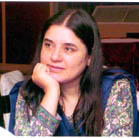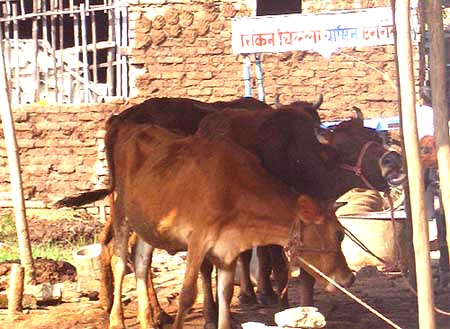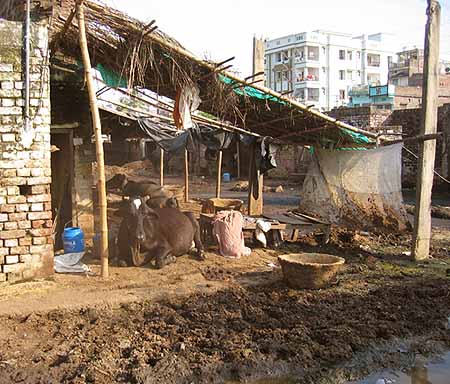|  Some
years ago an English woman who had the gift of being able to understand animals
came to my shelter in Delhi. Walking up to a cow, she turned to me and said “
She says that her head still hurts ” The woman did not know that the cow
had been in an accident. Some
years ago an English woman who had the gift of being able to understand animals
came to my shelter in Delhi. Walking up to a cow, she turned to me and said “
She says that her head still hurts ” The woman did not know that the cow
had been in an accident.
When
you next have a steak or wear new leather shoes , remember that this cow could
articulate her pain. We are just not smart enough to understand her voice. John
Webster, professor of animal husbandry at Bristol, has just published a book on
the topic, Animal Welfare: Limping Towards Eden. “People have assumed that
because animals have smaller brains they suffer less than humans. That is a pathetic
piece of logic,” he says. Just
because a cow moves slowly , that really doesn’t make her stupid. In fact
cows are intelligent and curious beings who enjoy solving problems . They have
long memories and are capable of learning lessons from each other, just as humans
do. Donald
Broom, professor of Animal Welfare at Cambridge University, describes how cows
are excited by solving intellectual challenges. In one study, researchers set
cows with a task where they had to find how to open a door to get some food. An
electroencephalograph was used to measure their brainwaves.Their brainwaves showed
their excitement; their heartbeat went up and some even jumped into the air when
they found the solution. Research
has shown that cows clearly understand cause-and-effect relationships—a sure-fire
sign of advanced cognitive abilities. For example, cows can learn how to push
a lever to operate a drinking fountain when they’re thirsty or to press a
button with their heads to release grain when they’re hungry. Like humans
, cows also quickly learn to stay away from things that cause them pain, like
electric fences and unkind humans. Cows
also have the ability to learn from each other, another indication of their intelligence,
which is comparable to that of a dog . According the Humane Society of the United
States, if an individual cow in a herd is shocked by an electric fence, the rest
will become alarmed and learn to avoid it. Their senses are very acute, especially
their sense of smell. Their first instinct is to come over and sniff you out,
just like dogs. Their sense of timing is uncanny .They know to the minute when
they are going to be milked or fed Cows
don’t forget lessons that they’ve learned. They have impressive memories.
They remember their homes and can find their way back to their favorite spots
( which is more than I can !). They remember where things are located, migration
routes, watering holes, shelter and the location of their newborn calf. Researchers
also report that cows can remember the best eating spots in a pasture many months
later. Stories of cows who used their navigation capabilities to find their way
back home after being sold at auction are common. Some cows never forget those
who have hurt them either, and they’ve been known to hold grudges against
other members of their herd. Rosamund Young details a quarrel between a grandmother
cow and her daughter. Grandmother cows often help their daughters with mothering
duties, but a cow named Olivia wanted no part of that. She ignored her mother’s
offers to help groom her. Offended, her mother finally marched off to another
field to graze with her friends and never “spoke” to her daughter again.
A
herd of cows is very much like a pack of wolves, with complex social dynamics.
Each cow can recognize more than 100 members of the herd and herd leaders are
chosen for their intelligence, inquisitiveness, confidence, experience, and good
social skills, while bullying, selfishness, size, and strength are not recognized
as suitable leadership qualities. Webster has documented how cows within a herd
form smaller friendship groups of between two and four animals with whom they
spend most of their time, often grooming and licking each other. The relationships
between mothers and daughters are especially strong, and calves play with other
babies. They like to sleep near their families and when the herd settles down
for a nap, each cow’s position and the order in which they lie down is directly
related to their status in the herd. 
Raising
cows in crowded lots, is very stressful to them . University of Saskatchewan researcher
Jon Watts notes that cows who are kept in groups of more than 200 get confused
, scared and constantly fight for dominance . This is akin to how humans would
feel if we were penned in a tiny space with thousands of unfamiliar people. Just
like us, cows like to be near their families and friends. Cows
are emotional animals who have likes and dislikes, just like humans do. The chairman
of the National Farmers Union in the United Kingdom, Tim Sell, explains, “They
have emotional upheavals. When it is a miserable, cold day, they will all be miserable,
but when it is nice and sunny, you can almost see them smiling.” Cows use
their body posture and vocal sounds to express a whole range of emotions, including
contentment, interest, anger, and distress. They mourn the death of those they
love, even shedding tears over their loss. With
kind treatment, cows can be very loyal companions. In her book Peaceful Kingdom:
Random Acts of Kindness by Animals, Stephanie Laland writes that when the Rev.
O. F. Robertson began to go blind, his cow Mary became his “seeing-eye cow.”
Mary would walk along with him, nudging him away from obstacles. She accompanied
Robertson everywhere he went for the rest of his life. When
they are separated from their families, friends, or human companions, cows grieve
over the loss. Researchers report that cows become visibly distressed after even
a brief separation.The mother-calf bond is particularly strong, and there are
countless reports of mother cows who continue to frantically call and search for
their babies after the calves have been taken away and sold to butchers. They
stand in acute grief outside the pen where they had last seen their babies and
bellow for days, moving when forced to do so. Weks later they will still return
to the same spot to see if their calves have come back. Like
all animals, cows value their lives and don’t want to die. Stories abound
of cows who have gone to extraordinary lengths to fight for their lives. A cow
named Suzie was about to be loaded on a freighter when she turned around, ran
back down the gangplank, and leaped into the river. Even though she was pregnant
she managed to swim all the way across the river, eluding capture for several
days. She was rescued by PETA and sent to a sanctuary for farmed animals. When
workers at a slaughterhouse in Massachusetts went on break, Emily the cow made
a break . She took a tremendous leap over a five-foot gate and escaped into the
woods, surviving for several weeks in the snowiest winter. When she was eventually
caught , public outcry demanded that the slaughterhouse surrender her to a sanctuary
where she now lives happily. 
Eating
meat means eating animals who don’t want to die. In the U.S., more than 40
million cows are killed in the meat and dairy industries every year. When they
are still very young, cows are burned with hot irons , their testicles are ripped
out of their scrotums , and their horns are cut or burned off—all without
painkillers. Once they have grown , they are sent to massive, muddy feedlots to
be fattened for slaughter. Millions of cows living in dairies spend most of their
lives either in large sheds or on feces-caked mud lots where disease is rampant.
Cows raised for their milk are repeatedly impregnated, and their calves are taken
from them and sent to veal farms or other dairy farms. When their exhausted bodies
can no longer produce enough milk, they are sent to slaughter. Every
night , in India, we see trucks crushed full of cows going for illegal slaughter.
Many cows die on the way. The rest are taken onto the killing floor, where their
throats are cut and they are skinned in front of each other. They die piece by
piece. Every
time you choose to buy leather or drink milk you kill a gentle intelligent sensitive
being. Cows are not just oblivious. cud chewing milk machines – those terms
can be more aptly applied to so many humans instead. To
join the animal welfare movement contact : gandhim@nic.in previous
articles... 1.
Human Propensities of Cow 2.Trade
in WildLife 3.
Human Intelligence of Birds Comment Comments... Thank
You Madam for this wonderfull article on Propensities of Cow Human and thanks
you editor to benefit readers with such topics on prestigious Bihar Times . Ranjan
Rituraj Sinh , NOIDA mukhiya.jee@gmail.com
|